 From EcoFuture ™
From EcoFuture ™
 From EcoFuture ™
From EcoFuture ™
More recently Dave Foreman helped to found The Wildlands Project, an effort bringing together grassroots activists and conservation biologists to design and establish linked areas of wilderness extensive enough to support large mammals. In addition to being chair of
The Wildlands Project, he is executive editor of Wild Earth magazine and author of Confessions of an Eco-Warrior and The Big Outside (with Howie Wolke)."
-- Derrick Jensen
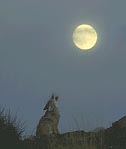 "For more than twenty years, Dave Foreman has been at the forefront of the conservation movement, working where political activism intersects with
ecological philosophy. In the 1970s, believing that the best way to preserve wilderness was to work within the system, he became the Southwest regional representative of The Wilderness Society. In 1980, disillusioned by the inability of mainstream conservation organizations to halt the destructive forces within our culture, he cofounded Earth First! The goal of Earth First! was to help develop a biocentric worldview and to translate that philosophy into action by fighting with uncompromising passion for the Earth.
"For more than twenty years, Dave Foreman has been at the forefront of the conservation movement, working where political activism intersects with
ecological philosophy. In the 1970s, believing that the best way to preserve wilderness was to work within the system, he became the Southwest regional representative of The Wilderness Society. In 1980, disillusioned by the inability of mainstream conservation organizations to halt the destructive forces within our culture, he cofounded Earth First! The goal of Earth First! was to help develop a biocentric worldview and to translate that philosophy into action by fighting with uncompromising passion for the Earth.
Derrick Jensen: You've written that the defense of the Earth is not "Lord Man protecting something less than himself. Rather, it is a humble joining with Earth, becoming the rain forest, the desert, the mountain, the wilderness in defense of itself."
Dave Foreman: Our desire to protect wilderness comes from passion, from an emotional identification with wilderness. It's a sense of expanding the concept of the self to include the landscape around us and identifying with that landscape.
This may seem an alien concept on first blush, but for somebody who knows a place, who can sit in the desert, watch it and accept it for what it is, who does not need to experience it on a dirt bike, or for somebody who can go into an old-growth forest and sit underneath a five-hundred-year-old tree and try to pick up some wisdom from it, I don't think it is alien. We are place. We are connected to everything, and we are open to the world around us.
Aldo Leopold wrote that there are those who love wild things and sunsets, and those who do not. I think we all fundamentally and early on love wild things and sunsets, but some of us have it socialized out of us. We forget that love. There might be a point you can't turn back from. I feel sorry for people who don't have that identification with nature, because they're living half a life.
DJ: When are you happiest?
DF: When I'm not thinking abstractly. When I am being fully an animal, when I'm in the middle of a rapid on the river and having to respond to the river.
I'm happiest when I experience the moment entirely for what it is. I'm happiest when I'm bird-watching, or when I'm walking down a trail in the wilderness and the internal dialogue finally ceases -- I'm just there in the place. Our physical adaptation is for running or moving through wild country. That's when we're truly human and truly alive.
 I am a large mammal, a child of the Pleistocene, the age of large mammals.
It's natural to want to see other large mammals. I recently had the
joy of my life when I came in contact with a Jaguar on the Monkey River
in Belize. Rationality ceased, abstraction ceased. We ignore the fact that we need wilderness around us to be mentally healthy.
I am a large mammal, a child of the Pleistocene, the age of large mammals.
It's natural to want to see other large mammals. I recently had the
joy of my life when I came in contact with a Jaguar on the Monkey River
in Belize. Rationality ceased, abstraction ceased. We ignore the fact that we need wilderness around us to be mentally healthy.
DJ: Let's talk about abstraction. Elsewhere you've said that while deep ecology is your ethic, it's still an abstraction.
DF: All ethics are abstractions. The map is not the territory. The Western intellectual tradition really began, I believe, when Socrates told Phaedrus, "I am a man who loves learning, and trees and open spaces can't teach me a thing, whereas men in town do." We've been on the wrong path ever since, and deep ecology is an attempt by those of us from that tradition to try to get back to a more fundamental wisdom. This means it's going to be an abstraction for a while, until we are able to somehow reinhabit the Earth in some kind of future primitive.
How that's going to happen, I don't know. My job, which I do with The Wildlands Project, is to conceptualize a new kind of reserve system that does deep ecology on the ground, because deep ecology isn't deep ecology when it's just academic intellectual masturbation. Deep ecology becomes something real when it motivates our day-to-day actions, and there is no more honorable thing any of us can do with our lives than to work to put part of the world off-limits to the activities of human beings.
DJ: Why?
DF: Right now human beings are agents of biodiversity destruction on the order of an extraterrestrial comet. Leading biologists tell us we may lose one-third of all species on Earth in the next forty years. Michael Soulé, the founder of the Society for Conservation Biology, says for all practical purposes vertebrate evolution is at an end, and that the only large mammals left in another decade or two will be those we consciously choose to allow to exist. We are destroying the building blocks of nature that have been building for nearly four billion years.
In this country, wilderness preservation has focused on scenic rocks and ice above timberline, while giving up more important lower elevation forests. We've ignored grassland areas, river bottoms, places that might not be as spectacular or as suited for recreation but that are more important from a biodiversity standpoint.
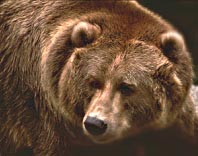 The result is that the national parks and wilderness areas have failed to protect the biological and natural heritage of North America. W. D. Newmark, in his study of national parks about ten years ago, found that even Yellowstone National Park and the surrounding area was too small
to maintain viable populations of Grizzly Bears or Gray Wolves.
The result is that the national parks and wilderness areas have failed to protect the biological and natural heritage of North America. W. D. Newmark, in his study of national parks about ten years ago, found that even Yellowstone National Park and the surrounding area was too small
to maintain viable populations of Grizzly Bears or Gray Wolves.
Because we might not have any places big enough for large predators except in Alaska or northern Canada, Reed Noss and other conservation biologists have begun working with metapopulations [see: "Gap Analysis"]. That involves preserving corridors which link, for example, the Yellowstone National Park ecosystem with the Glacier/Bob Marshall ecosystem and the central Idaho ecosystem, as well as the Canadian Rockies. In the East, we want a connected chain of wilderness areas from the Everglades to northern Maine and into Canada, so the Eastern Cougar and the Florida Panther will be once again connected. And then of course we need east-west corridors.
We need to preserve more than little outdoor museums, snapshots in time. The Wildlands Project is fundamentally about protecting the evolutionary process, the potentiality for future speciation. For that we need areas large enough to have stochastic events, like forest fires or the hurricane that went across the Everglades.
DJ: You seem to focus on large predators.
DF: If there isn't room for large predators -- for Wolves and Bears and Saltwater Crocodiles and Harpy Eagles -- human beings have clearly exceeded local carrying capacity. Educated people in the world today nearly all accept evolution as a scientific fact. But very few people have accepted the social implications of Darwinian natural selection -- that we are animals. You get cornucopians of the right and the left, whether they take their economic theories from Adam Smith or Karl Marx, that refuse any notion of limits, or the idea of carrying capacity, as it's applied to human beings. The Wildlands Project is a way to come to terms with that. And if we can protect viable populations of large predators, we can figure 90 percent of all biodiversity is being protected.
DJ: Why protect biodiversity?
DF: For its own sake. We have no right to destroy the biodiversity of this planet. These other species and ecosystems exist for their own sakes. When I saw that Jaguar in Belize, she did not consider herself watchable wildlife, or a source of joy for me. She has a life just as full of meaning and joy to her as mine is to me.
All this goes to the heart of what kind of people we are. I can't imagine the legacy of destroying large mammals on this Earth, destroying coral reef ecosystems, songbirds, amphibians. It's a burden I can't bear. We need to come to terms with what we're doing, and we need to think about our legacy.
If you want to put it in somewhat religious terms, fighting to save biodiversity, the process of evolution, is a way for us to save our souls.
DJ: How will The Wildlands Project be implemented?
DF: The first thing is to talk about it, prepare a draft proposal for the entire North American continent with lines on maps and throw it on the table. That will be helpful because it will expand the terms of the debate, expand the possible.
On a practical basis, we start with what we have: The
Klamath Forest Alliance has proposed corridors between wilderness areas in northwestern California and has filed lawsuits and
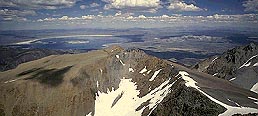 appeals to protect those corridors from Forest Service timber sales. Folks with the Southern Rockies Ecosystem Project are mapping all remaining old growth in Colorado and figuring how to connect it into a single linked reserve system.
appeals to protect those corridors from Forest Service timber sales. Folks with the Southern Rockies Ecosystem Project are mapping all remaining old growth in Colorado and figuring how to connect it into a single linked reserve system.
When we're constantly wrapped up in brushfires, it's hard to look at the big picture. Tying local battles into a continental wilderness recovery network will help frontline conservation activists determine their priorities. And it gives folks a vision, encourages them, gives them more energy.
It also helps us do things like look at northern Maine, where 10 million uninhabited acres are owned by paper companies. That land is available for two hundred dollars or less an acre. Ten million acres essentially for the price of a Stealth bomber. By putting it in the context of this continental system, we can argue better for the money to acquire it. If we acquired it, we could have an Alaska-size wilderness wildlife refuge in New England, and in twenty years there would be Wolves and Caribou and Lynx and Eastern Cougar there.
The Wildlands Project is audacious. It's big not only in terms of space but also in terms of time. If we identify, say, a private ranch in Montana that's between two wilderness reserves, and we feel that fifty years from now it will be necessary as a corridor for Wolves to go from one area to another, we can say to the rancher, "We don't want you to give up your ranch now. But let us put a conservation easement on it. Let's work out the tax details so you can donate it in your will to this reserve system." When it's needed as a corridor, it will be there.
DJ: How does the possibility of a socio-industrial crash impact your conservation strategies?
DF: I've tried to develop a strategy where it doesn't matter. I personally believe there's going to be a crash. I don't know when or how it will take place, whether it will be a pandemic, a massive economic crash, a clash of centralized state governments, a massive famine, or whatever, but I do know industrial civilization cannot go on. The anthropologist Marvin Harris talks about the industrial bubble. As this bubble expands its skin becomes thinner. It is going to pop.
From that perspective, The Wildlands Project is trying to protect as much land as possible, and to protect breeding stocks of all species, so that after industrialism collapses there will be enough building blocks of natural diversity to recolonize the world.
On the other hand, if we come to our senses, build some kind of sustainable society, control overpopulation and see a steady decrease in human population, develop a steady-state economics, develop the kind of agriculture Wes Jackson, Wendell Berry, and others are working on, the kind of forestry Orville Camp is working on, and reinhabitory communities like folks in northern California or the Oregon backwoods are trying to create, the results are the same. This kind of North American wilderness recovery strategy becomes a key element in that new society, and becomes sacred space where the new people will fully become human beings.
DJ: Where does fun fit into this?
DF: There's incredible fun in working with people you connect with and feel close to. Fun comes from going into the wilderness and experiencing it on its own terms. Fun comes from learning humility and respect. My friend Doug Peacock says we need Grizzly Bears to teach us humility, and he jokes that while he might think about packing a pistol in a city, he never would when he's in Bear country. You need to go without a gun so you aren't on top of the food chain.
Fun comes from the privilege of being born into this blue-green living planet, no matter how bad the situation gets. Fun has to motivate it all, or as I prefer to say, joy. Joy in living. Joy in fighting the good fight. Even sometimes joy in saying, "Today is a good day to die," and going for it.
And joy has to motivate your activism. We need to walk in respect on the earth, not out of a sense of duty, but out of a sense of joy. A couple of years ago Wendell Berry said to me that deep ecology needs to be careful not to just establish rules. It needs to be something that wells up from within. By respecting the land you walk softly on it.
DJ: You were one of the founders of Earth First! and helped make famous the phrase, "No compromise in the defense of Mother Earth."
DF: I'm all for compromise. It's just that our opportunity for compromise passed about one hundred years ago. We're down to the last 5 percent of old-growth forest. We could have compromised at 50 percent, but we didn't. We've got to save all that's left and begin to restore some. Paul Sears, one of the great botanists of America back in the thirties, forties, and fifties, said we needed to protect 25 percent of the United Stares in inviolate condition. Conservation biologists today are saying it's more like 50 percent, if we are going to have the whole range and diversity of species. When we're down to the last four percent of the redwood forests, we're way beyond that kind of compromise.
What we can do is be concerned about the poor bastards who all alone have been misled by the logging companies. We can try to retrain them. We can do something for community stability. The timber-dependent communities in the Pacific Northwest have been destroyed by the timber companies. The people have been exploited, and they continue to be exploited. Bernard DeVoto, editor of Harper's, saw that nearly fifty years ago when he said that the West, for all its emphasis on individualism, is the part of America most dominated by outside economic interests [1948 Across the Wide Missouri, Pulitzer Prize winner]. The rugged individualists of the West, whether they're cowboys or loggers or miners or farmers, have always been more than ready to sell themselves to the corporate bidder with the most money and then to blame somebody else when the corporation cuts and runs.
Let's face it, the loggers of the Pacific Northwest have had the wool pulled over their eyes by the
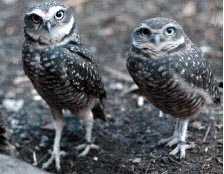 corporations, and in their natural frustration and rage at having seen their lifestyle and communities destroyed, are lashing out at the handiest scapegoat, be it conservationist or Spotted Owl. If they would quit beating us up and quit killing Spotted Owls, maybe they would realize that conservationists who are working to create a sustainable economy in the Pacific Northwest are their best friends.
corporations, and in their natural frustration and rage at having seen their lifestyle and communities destroyed, are lashing out at the handiest scapegoat, be it conservationist or Spotted Owl. If they would quit beating us up and quit killing Spotted Owls, maybe they would realize that conservationists who are working to create a sustainable economy in the Pacific Northwest are their best friends.
DJ: Do you see any way either to reform or get rid of the idea of corporations?
DF: The whole notion of corporations has to be radically redefined. Big corporations must have a deeper community interest, something beyond making a profit for their stockholders.
I get pissed off at the so-called conservatives today who prattle on about property rights -- rights this and rights that -- without any sense of responsibility. With rights come responsibilities and accountability. The only time they want to talk about responsibility is when Dan Quayle goes after some poor, uneducated, trodden-down teenage mother in a Saint Louis slum. I want to talk about the responsibility of Armand Hammer for murdering people at Love Canal, I want to talk about the responsibility of Harry Merle and other timber company barons for destroying communities and the land base on the Pacific Coast.
Our priorities are insane. When I went to Washington, D.C., fifteen years ago to be a lobbyist for The Wilderness Society, a senator took me aside. He told me to put my heart in a safe-deposit box and replace my brain with a pocket calculator. He told me to quote only economists and engineers and said if I was ever emotional I would lose my credibility.
But damn it, I am emotional. I'm an animal, and I'm proud of it, Descartes was wrong when he said, "I think, therefore I am." Our consciousness, our being, is not all up here in the skullbox. It's our whole body we think with, and it goes beyond that. David Brower tells us that you can't take a California Condor out of the wild and put it in the L.A. zoo and still have a Condor, because the being of the Condor does not end at those black feathers at the tips of its wings. It's the rising thermals over the Coast Range. It's the rocky crag where she lays her egg. It's the carrion she feeds on. The Condor is place, and as we were talking about earlier, we are place, too.
DJ: What will it take for us to survive?
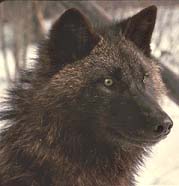 DF: Courage. In my speeches I talk about what Aldo Leopold called green fire. When Aldo Leopold was young he used to shoot any Wolf he saw, and years later, in
A Sand County Almanac, he wrote how the death of one of those Wolves changed his life. He said, "We reached the old wolf in time to watch a fierce green fire dying in her eyes. I realized then, and have known ever since, that there was something new to me in those eyes -- something known only to her and to the mountain. I was young then, and full of trigger-itch; I thought that because fewer wolves meant more deer, that no wolves would mean hunters' paradise. But after seeing the green fire die, I sensed that neither the wolf nor the mountain agreed with such a view."
DF: Courage. In my speeches I talk about what Aldo Leopold called green fire. When Aldo Leopold was young he used to shoot any Wolf he saw, and years later, in
A Sand County Almanac, he wrote how the death of one of those Wolves changed his life. He said, "We reached the old wolf in time to watch a fierce green fire dying in her eyes. I realized then, and have known ever since, that there was something new to me in those eyes -- something known only to her and to the mountain. I was young then, and full of trigger-itch; I thought that because fewer wolves meant more deer, that no wolves would mean hunters' paradise. But after seeing the green fire die, I sensed that neither the wolf nor the mountain agreed with such a view."
We need that green fire in our eyes. Somehow we've got to remember how to think like a mountain, and somehow we have to speak for Wolf.
Each of us is an animal, and a child of this earth. Each of us has responsibility to all other animals and plants and to the process of evolution that created us. All of us alive now are members of the most important generation of human beings who have ever lived, because we're determining the future, not just for a hundred years, but for a billion years. When we cut a huge limb off the tree of natural diversity, we're forever halting the evolutionary potential of that branch of life. That's what if fundamentally comes down to.
Nobody has ever lived who is more important.
A reporter once asked me what I thought my nephew's and niece's children would think of me. Would they consider their great-uncle an ecoterrorist, a radical, a lunatic conservationist? I said, "No. They're going to ask, 'Why the hell didn't you fight harder? Why weren't you more radical? Why weren't you more militant? Why didn't you save more forests?' "
That's what I ask, too. Goddamnit, where are the 70 million Bison, where are the Passenger Pigeons, where are the Carolina Parakeets? Where's the Sea Mink, the Labrador Duck, the Heath Hen? Where's the tallgrass prairie?
The conservation movement has failed to challenge people with an ethical mandate. We seem to have gotten the notion we have to make it palatable for people, make it easy for them. "Oh, you can have your cars and your freeways, and we can protect nice scenic national parks too.
A new vision must be articulated. Martin Luther King saying "I have a dream" energized the country. People responded to that dream. But since that dream was institutionalized, sort of, in the Civil Rights Act and the Voting Rights Act, the dream has never been explicitly stated again. That's really sad, and that's why even though the civil rights movement has had great successes, there have been great failures.
By the same token, I think conservationists had a wonderful dream with the Wilderness Act, but then we fell into the comfortable reaction.
DJ: The Wildlands Project then essentially the articulation of a new dream?
DF: Absolutely. A totally audacious dream.
For more information regarding the "Wildlands Project", you can
contact:
The Wildlands Project
P.O. Box 1276
McMinnville, OR, USA 97128
Voice: USA 503-434-9848 -- Fax: USA 503-434-2781
For information regarding the "Corridors of Life Program" in USA's Northern Rocky Mountain region, see American Wildlands.
Fax: USA (415) 291-1602
Derrick Jensen's dialogue was adapted to Web hypertext 26 August 95 by
Wayne L. Pendley.
Wayne also adapted most of the images on this page from originals provided by
Corel Professional Photos on CD-ROM. The image of two owls was provided by Purdue's
On-line Writing Lab (OWL). The Jaguar image was adapted from the Belize Online Tourist Guide.